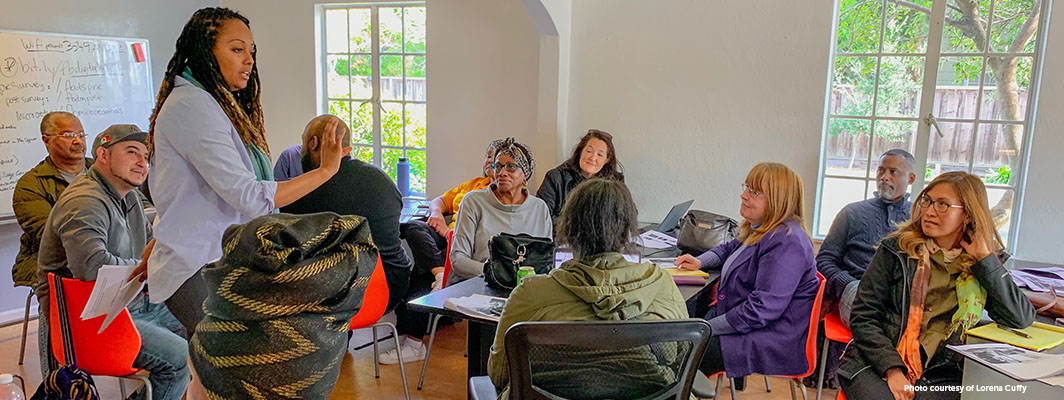
August 7, 2019 | By Sarah Cacicio and Lorena Cuffy
Community providers, such as the University AME Zion Church (UAMEZ) in Palo Alto, California, understand that digital literacy development, like any learning, starts with building trust in the community and meeting learners where they are. The church has come to play a critical role in meeting the digital learning needs of adult members, from turning on a computer to navigating online job applications or enrolling a child in school. Lorena Cuffy, digital outreach coordinator at UAMEZ, said, “Because we are a church community, we have people from all ages, backgrounds, and walks of life. Our organization has a unique opportunity to engage non-traditional learners in acquiring the digital skills they need.”
UAMEZ recently launched an innovative digital ministry called Tech Team, where volunteers teach the practical application of digital skills during weekly worship. Lorena encourages members of their congregation to “step outside of their comfort zones and open their minds to learning new things in new ways.” The Tech Team ministry provides ample opportunities for learners to develop skills across the four broad categories of digital literacy as defined by Dudeney, Hockly and Pegrum (2013): language; information; connections; and re-design.
Literacy skills related to language and communication involve being able to read, understand, and write texts in both print and multimedia formats. These skills include the ability to navigate, interpret information, generate information, and communicate online and through mobile devices.
UAMEZ’s Tech Team builds capacity for language literacies in their daily ministry, starting with basic skills like how to use a smartphone and how to draft an email or text message. They provide free, drop-in lab times, volunteer-led classes, and one-on-one support in basic computer skills. The Tech Team also offers ongoing resume writing workshops, which allow learners to communicate their job skills and experiences through writing in a digital platform. Finally, members learn to use software such as Faithlife Proclaim and SlingStudio to broadcast services and events.
Literacy skills related to information involve the ability to use search engines effectively and to evaluate the credibility of information. UAMEZ’s Tech Team designed opportunities for learners to “build their internet confidence” by performing Google searches and using web apps, such as Google Drive, for productivity. They also boost information literacies by teaching learners how to access and utilize online resources. UAMEZ helps learners transfer online research skills into practical applications to improve educational and career pathways, such as conducting a job search, completing an application, and uploading relevant documents.
Literacy skills related to connections involve the ability to use online social and professional networks, like Instagram, WhatsApp, or LinkedIn. These skills allow users to communicate with and inform others, build collaboration and support, and develop a reputation and influence.
Tech Team members learn to navigate livestreams on social media such as FaithLife, for example. Through the Digital Promise Facebook Community Boost Project, UAMEZ also provides monthly social media marketing workshops where learners from the greater Silicon Valley community, including job seekers, career changers, and small business owners, can acquire basic digital marketing skills.
Re-design, or remix, literacy refers to the ability to construct new meanings, texts, or multimedia products with existing texts, images, and other artifacts. To help learners develop these increasingly valuable skills, UAMEZ prepares its members to earn Facebook social media marketing micro-credentials. As part of this process, learners may upload artifacts to demonstrate and share their digital marketing competencies, such as marketing with Facebook Ads to reach a target audience or using Instagram to advertise your business and create a more targeted customer experience. Lorena explained, “Micro-credentials offer a way to legitimize your skills when breaking into a new role, company, or industry. It’s like a badge of honor and gives individuals more confidence when walking into an opportunity.”
UAMEZ understands the challenges learners face in gaining digital skills. Lorena said, “The biggest challenge is offering a consistent space for adult learners to build their skills over time. Repetition is important. It is a long process, considering most of our learners have full-time jobs, children, and competing commitments and responsibilities.”
Lorena’s work has also expanded to supporting efforts in other churches and organizations to create digital inclusion fellowships in their communities through regional train-the-trainer workshops. As Lorena poignantly noted, “The greatest need for organizations working with digital learners is to have instructors with immense patience and trust in the community.” Importantly, she adds, “providing meals and atmospheres that are kid-friendly are also essential.”
A critical component of the Digital Promise mission is to close the Digital Learning Gap for adult learners by increasing access to, participation in, and powerful use of technology to advance equitable learning outcomes. Lorena’s work with the UAMEZ Tech Team demonstrates that the pathways to advancing digital skills among adult learners will and must vary, depending on the particular educational needs and context. As Lorena said, “If you build an inclusive setting, it will become like a second home for members of the community.”
Interested in the latest ideas and technologies to improve adult learning and workforce development? Sign up for Digital Promise’s Spotlight newsletter, a monthly digest highlighting current initiatives and innovations to reduce the digital literacy gap and expand economic opportunities in adult learning communities.
By Rastee Chaudhry and Barbara Pape
By Tamara Tate and Pati Ruiz